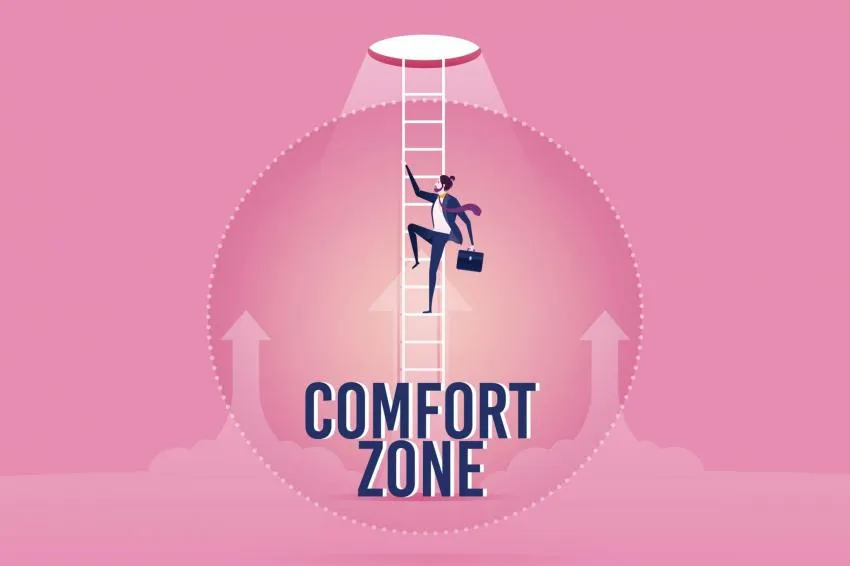Why The Comfort Zone Is Not Comfortable At All: 5 Easy Ways To Enter The Unexpected

The comfort zone is a safe space for everyone. It is a place where we feel comfortable and experience little stress and anxiety.
The comfort zone is defined as a psychological state of familiarity where an individual is in control of their environment.
Having that feeling brings us safety. Being in control of the surrounding environment allows for an individual to anticipate what happens next. Little surprises arise in the comfort zone and for that reason, it is dangerous.
Life is a rollercoaster of ups and downs and lefts to rights. No one knows what their life is going to be like and it is not something that can easily be controlled. Sometimes the best option is to make a radical choice to mix things up. Go to a new place, see new things, or take a risk. The comfort zone does not allow for any of that, which is exactly why it is comfortable.
Staying in the comfort zone hinders you from taking risks. It's easy to sit back and do what you have always done. That is comfortable. It's controllable and makes no attempt at surprising you. It's convenient, but should it really be described as comfortable?
On the surface, yes, but if you think about it more it really shouldn't. The place where no risks are taken is the safest place on Earth. Nothing unexpected will happen and everything can be anticipated, which doesn't reflect life at all.
Life isn't so simple that you can come up with a perfect plan and follow it exactly. Something will happen whether that be a new person coming into your life, a new job opportunity, or even a new way of thinking. An obstacle to that clear-cut path will present itself and two roads will then appear. One will be a detour to get back on your path to the original destination. The other will be a completely new path where you have no idea where you are going. That is the choice to stay in the comfort zone or to move out of it.
While I agree that remaining in the comfort zone is safer, will it be necessarily better? Is the more comfortable choice really the best option? Here's a story that I think might help you make up your mind.

Coming to a Crossroads
I was in my senior year of High School. It was time to apply to college, and after some convincing by my stepmother, I applied early decision to Miami University.
Within a few months, I heard back with an acceptance letter. As excited as I was, my heart sank. I knew that because of the choice I made I had to attend that school.
To give you context, in my younger days I was very shy and introverted. I stayed well within my comfort zone at all times. I was a safe kid and I was comfortable being that way. So as you probably suspect, I was very afraid to attend a university outside of the state I lived in. Needless to say, once the time came to move I was not too excited.
After the move, I said goodbye to my family. I stood alone in front of my dorm, 4 hours away from home and the feelings hit me like a train. I went back up to my dorm with a fake smile and introduced myself to my roommate. After that, I never looked back.
I can now look back on my college experience with a smile, but that is only possible because of how I took a leap of faith. Thinking back on it now, I knew that I needed a change, but I also knew myself. I knew that I would not be strong enough to make the decision to go out of state if I had the choice to pick either Miami University or Michigan State University. I knew that I'd pick the latter if push came to shove. So I backed myself into a corner by applying early decision and once I was accepted, I had to move forward.
I remember thinking, during the first week, that I could either stay in my room or get out. I decided to put myself out there and make as many friends as I could. Once I did that I began to thrive.
I needed the feeling of fight or flight. In my case, it was more thrive or fail, but I simply chose the more appealing option.

1. Force Yourself Into a Corner
Like I did to myself, forcing yourself into a corner is an effective strategy to exit the comfort zone. Two options are presented. Either to sink or swim? The answer is an obvious one.
To accomplish this, it is best to make a decision that you can't back out from. Taking the phrase literally, do not give yourself an escape. Force yourself into a situation where you have to step up and out of your comfort zone. This will give you an opportunity to grow and become more comfortable with the uncomfortable.
2. Be On Your Own
It's much easier to be in a group. Knowing that you are with other people makes you feel comfortable. To step out of your comfort zone try it alone.
Being by yourself allows for no safety net. If you go to a work environment, wedding, or party on your own it forces you to get to know new people. Successfully taking you out of your comfort zone and facing an obstacle on your own. That will give you the confidence to continue to take risks.
3. Try Something New
Everyone gets set in their ways. I know I've been guilty of doing this. Routines are important, but variety is just as vital. New experiences create new situations.
Try a workout class, learn a new recipe, play a new sport, the options are endless. It doesn't matter what it is, the important thing is to do something you've never done. This allows for you to start from the beginning and learn. The ability to engage with new activities and throw yourself into them creates the chance to grow.
4. Engage With The Environment
It is easy to keep your head down. To move through the crowds without any interaction. Instead, hold your head out high and engage. Wherever you are it is possible to engage with your surroundings. Whether it's a coffee shop, a park, or even walking down the street, try to engage with your environment. It is much more rewarding to strike up a conversation with a stranger for five minutes than rushing off to your next destination.
Doing this allows for random interactions that have the chance to turn into something. Creating new friends, chances to go to new places, and opportunities to learn something new. The possibilities are endless, but this will only happen if you try to engage with your environment.
5. Get Out
This idea is similar to the ultimatum I gave myself. To either stay in my dorm or get out as much as possible. While staying in is comfortable it doesn't allow for many chances to meet new people, see new things, and experience something new. It's typical and usually, nothing out of the ordinary would happen. So, try to get out.
Go to a bar, walk around the city, or grab some coffee. Doing those things bring you to a new environment and you never know what will happen. Even though that can be scary, it is also just as exciting. Take a chance and get out, the comfort zone of your home will always be there.
All in all, I needed to escape the comfort zone to grow and become who I am today. I can't make a promise that the same will happen to you, but I can say that staying in your comfort zone won't allow for as many new experiences to occur. So try it. Step out of the comfort of your home and see what the world has to offer. I think you will be pleasantly surprised once you do.
Opinions and Perspectives
Think I'll start with the trying something new suggestion. Seems least intimidating.
Just moved to a new city alone. This article perfectly describes what I'm going through.
Makes me think about how comfort zones expand when we regularly push their boundaries.
This article just convinced me to finally submit my art to that gallery. Scary but exciting!
Never realized how much my fear of the unexpected was limiting my life until reading this.
Started applying these principles three months ago. Already feeling more confident and capable.
Interesting how discomfort can lead to growth. Changed my perspective on challenges.
The article helped me understand why I feel stuck despite being comfortable. Time for a change.
Going to start small by taking a different route to work tomorrow. Baby steps!
Wonder how many opportunities I've missed by staying comfortable all these years.
Try setting small, achievable challenges that stretch you just a bit each time. Works for me.
I struggle with the balance between pushing myself and respecting my limits. Any advice?
The part about forcing yourself into a corner reminds me of burning bridges to ensure forward movement.
My comfort zone was holding me back in my relationship. Taking risks to be more vulnerable now.
The article made me realize how much energy I spend avoiding discomfort instead of embracing growth.
Anyone else feel like their comfort zone shrunk during the pandemic? Working on expanding it again.
Been applying these principles at work. Already seeing positive changes in my career.
The section about engaging with your environment inspired me to finally join that local community group.
It's not about taking unnecessary risks though, it's about growing beyond our self-imposed limitations.
Nice article but where's the acknowledgment that some people have legitimate reasons for staying safe?
The college story reminded me of my own experience moving abroad. Sometimes the scariest choices have the best outcomes.
This sparked a great discussion with my partner about how we both avoid challenging ourselves.
Never thought about how staying in my comfort zone might be more uncomfortable in the long run.
The article could have mentioned how cultural differences affect our comfort zones.
After reading this, I signed up for a solo travel experience. Nervous but excited!
The idea that comfort isn't really comfortable is fascinating. Made me question a lot of my choices.
These principles helped me overcome social anxiety. Started with small interactions and built up from there.
Would love some advice on helping my teenagers step out of their comfort zones without pushing too hard.
The comparison between the comfort zone and real life is spot on. Life isn't predictable, so why pretend it is?
Actually, I think that's the point. When we have no choice but to adapt, we often surprise ourselves.
Not sure about forcing yourself into corners. Feels like it could backfire badly.
Tried engaging with my environment yesterday. Had a great chat with my barista for the first time ever.
The part about being on your own hits different after the pandemic. We got too comfortable being isolated.
Anyone else notice how their comfort zone expanded once they started pushing its boundaries?
Been stuck in my job for 10 years because it's comfortable. This article is the push I needed.
I like how the article doesn't promise success but encourages trying anyway.
The advice about trying something new weekly seems doable. Starting my list now!
Wonder how this applies to relationships? Sometimes we stay in our comfort zone with the same type of partners.
That point about not giving yourself an escape really resonates. I always leave myself a back door and end up using it.
I've found that having a support system makes it easier to take risks outside my comfort zone.
The article makes good points but seems to assume everyone has the same baseline of comfort.
This reminds me of when I switched careers at 45. Terrifying but the best decision I ever made.
I'm trying to balance stepping out of my comfort zone while managing anxiety. Anyone else dealing with this?
The sink or swim analogy is powerful. Sometimes we need that pressure to discover what we're capable of.
Reading this made me realize I've been using my routine as an excuse to avoid growth.
Wouldn't mind some more specific examples of how to engage with your environment safely, especially for women.
I really connected with the part about standing alone in front of the dorm. Felt that anxiety in my bones.
The article could have addressed how mental health plays into this. It's not always as simple as just stepping out.
Sometimes I wonder if people confuse being in their comfort zone with having healthy boundaries.
The idea of forcing yourself into a corner worked for me too. I signed up for a public speaking event and couldn't back out.
Just tried a new workout class yesterday after reading this. Was terrified but ended up loving it!
I appreciate how the article acknowledges that the comfort zone feels safe but questions if it's really comfortable.
You're missing the point. The principle applies to any situation where we have choices, big or small.
Anyone else think the college story was a bit privileged? Not everyone has the option to make such choices.
I've been applying the getting out more principle for a month now. Already made three new friends!
My therapist actually recommended this article to me. It's helping me understand why I resist change so much.
I find it interesting that the comfort zone is described as dangerous. Never thought about it from that perspective.
The part about engaging with your environment reminds me of how much time we spend looking at our phones instead of connecting with people.
Starting small helped me. I began with ordering something different at restaurants, then gradually took bigger risks.
What specific new activities would you recommend for someone just starting to step out of their comfort zone?
The article makes a good point about routines vs variety. I never thought about it that way before.
Being on your own is underrated. I used to hate dining alone, now I actually enjoy it.
These 5 steps seem practical enough to try. I might start with trying something new each week.
True, but staying there permanently is what the article warns against. It's about finding the right balance.
The comfort zone isn't always bad though. We need some stability in our lives to function properly.
Small steps are fine, but sometimes you need that big push. I moved to a different country alone and it changed my life completely.
I don't think pushing yourself too far too fast is healthy. Maybe we should focus on taking small steps first?
Getting out and engaging with the environment is definitely key. I started talking to strangers at coffee shops and it's amazing how many interesting conversations I've had.
The suggestion about forcing yourself into a corner is interesting but seems pretty extreme. Not sure if I agree with that approach.
Actually, failure is part of growth. I failed countless times when I started my own business, but each failure taught me something valuable.
What if stepping out of your comfort zone leads to failure? That's my biggest fear.
I love how the author shares their personal college experience. It makes the advice feel more relatable and authentic.
This article really hits home. I've been stuck in my comfort zone for years and I'm starting to realize how much it's holding me back.
